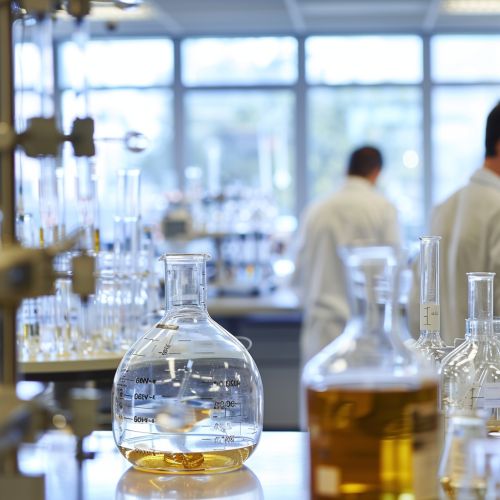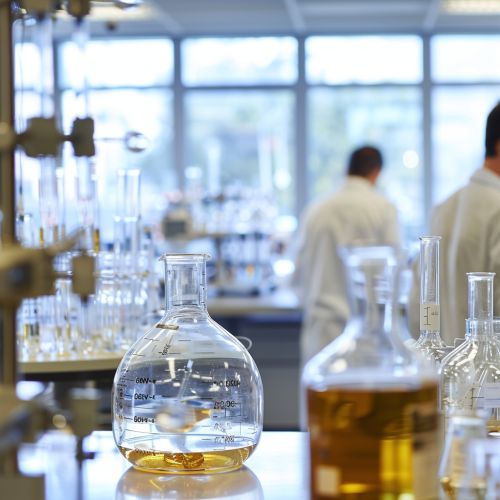Pharmaceutical Chemistry
Introduction
Pharmaceutical chemistry is a branch of chemistry that focuses on the design, synthesis, and development of pharmaceutical agents, or drugs. It combines principles from various disciplines such as organic chemistry, biochemistry, pharmacology, and molecular biology to create compounds that can be used to treat diseases and improve human health. This field is essential for the discovery and development of new medications and therapies.
History
The origins of pharmaceutical chemistry can be traced back to ancient civilizations where natural substances were used for medicinal purposes. The modern era of pharmaceutical chemistry began in the 19th century with the isolation of pure compounds from plants and the synthesis of new chemical entities. The development of synthetic organic chemistry in the early 20th century further accelerated the discovery of new drugs.
Drug Discovery and Design
Drug discovery is the process by which new candidate medications are discovered. It involves several stages, including target identification, lead compound identification, and lead optimization.
Target Identification
Target identification involves identifying the biological targets, such as proteins or genes, that play a crucial role in a disease process. This step is critical for the development of drugs that can specifically interact with these targets to modulate their activity.
Lead Compound Identification
Lead compounds are molecules that show promise in interacting with the biological target. High-throughput screening and computational methods are often used to identify these lead compounds from large libraries of chemicals.
Lead Optimization
Lead optimization involves modifying the chemical structure of lead compounds to improve their efficacy, selectivity, and pharmacokinetic properties. This step often requires extensive medicinal chemistry efforts to balance the desired biological activity with favorable drug-like properties.
Synthesis of Pharmaceutical Agents
The synthesis of pharmaceutical agents involves the chemical production of active pharmaceutical ingredients (APIs). This process can be divided into several key steps:
Route Selection
Route selection involves choosing the most efficient and cost-effective synthetic pathway to produce the desired compound. This step requires a deep understanding of organic chemistry and the reactivity of different functional groups.
Scale-Up
Scale-up is the process of increasing the production of a compound from laboratory scale to industrial scale. This step often involves optimizing reaction conditions and equipment to ensure consistent quality and yield.
Purification
Purification is the process of isolating the desired compound from impurities and by-products. Techniques such as crystallization, chromatography, and distillation are commonly used in this step.


Pharmacokinetics and Pharmacodynamics
Pharmacokinetics (PK) and pharmacodynamics (PD) are critical aspects of pharmaceutical chemistry that describe how drugs interact with the body and how the body affects drugs.
Pharmacokinetics
Pharmacokinetics involves the study of the absorption, distribution, metabolism, and excretion (ADME) of drugs. Understanding these processes is essential for determining the appropriate dosage and administration route for a drug.
Pharmacodynamics
Pharmacodynamics involves the study of the biochemical and physiological effects of drugs on the body. This includes understanding the mechanism of action, therapeutic effects, and potential side effects of a drug.
Analytical Methods
Analytical methods are essential for the characterization and quality control of pharmaceutical agents. These methods ensure that drugs meet the required standards of purity, potency, and safety.
Spectroscopy
Spectroscopy techniques, such as nuclear magnetic resonance (NMR) and mass spectrometry (MS), are used to determine the molecular structure and composition of compounds.
Chromatography
Chromatography techniques, such as high-performance liquid chromatography (HPLC) and gas chromatography (GC), are used to separate and quantify the components of a mixture.
Bioassays
Bioassays are experimental procedures that measure the biological activity of a compound. These assays are crucial for evaluating the efficacy and potency of new drugs.
Regulatory Affairs
Regulatory affairs involve ensuring that pharmaceutical products comply with the regulations and standards set by governmental agencies. This includes obtaining approval for new drugs, maintaining compliance with manufacturing practices, and monitoring post-market safety.
Drug Approval Process
The drug approval process involves several stages, including preclinical testing, clinical trials, and regulatory review. Each stage requires extensive documentation and evidence to demonstrate the safety and efficacy of the drug.
Good Manufacturing Practices (GMP)
Good Manufacturing Practices are guidelines that ensure the consistent production of high-quality pharmaceutical products. These practices cover all aspects of production, from raw material sourcing to final product packaging.
Future Directions
The future of pharmaceutical chemistry is likely to be shaped by advances in technology and a deeper understanding of biological systems. Areas such as personalized medicine, biotechnology, and artificial intelligence are expected to play a significant role in the discovery and development of new drugs.
